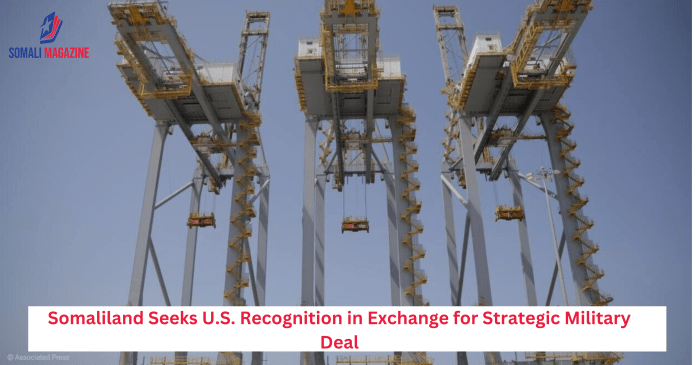Facebook Twitter (X) Instagram Somali Magazine - People's Magazine
With its port and airstrip on the Gulf of Aden, Somaliland offers the U.S. a foothold in a key region, hoping to finally gain international recognition after 34 years of self-rule
In the city of Berbera, Somaliland, an old Cold War airstrip stretches toward the sea, while nearby, workers unload goods at a busy port on the Gulf of Aden. These two sites—a port and an airport—are part of Somaliland’s plan to finally gain international recognition as an independent country.
Somaliland is a region of about 5 million people that has run its own affairs since 1991. It has its own currency, passport, military, and government, and has held peaceful, democratic elections. However, it’s still not officially recognized by any country. Now, Somaliland wants to strike a deal with former U.S. President Donald Trump: let the U.S. lease the port and airstrip in exchange for recognizing Somaliland as an independent nation.
Many Somalilanders believe that if the U.S.—the most powerful country in the world—recognizes them, other nations will follow. This could bring foreign investments, stronger diplomatic ties, and better security partnerships.
However, not everyone is on board. Some experts worry that recognizing Somaliland could cause instability in the region. It might upset countries like Egypt and Turkey, as well as the African Union, all of which fear that such a move could encourage other regions in Africa to break away and demand independence too.
The timing might work in Somaliland’s favor. The U.S. is thinking about closing its embassy in Somalia due to security threats. The Red Sea has also become more dangerous, with Houthi rebels from Yemen attacking shipping routes. A U.S. base in Somaliland could help protect this key waterway and reduce China’s growing influence in Africa.
Somaliland’s President Abdirahman Mohamed Abdullahi believes this is the best chance they’ve had in decades. He hopes Trump’s business-minded approach will make the deal appealing. Abdullahi wants to travel to Washington soon to discuss the proposal, which includes allowing the U.S. to build a military base along Somaliland’s 500-mile coastline.
U.S. generals have already warned Congress that terrorist groups like al-Shabab and ISIS are becoming more active in Somalia and pose a growing threat. A base in Somaliland, next to the long Berbera runway built by the Soviets in the 1970s, could help the U.S. better respond to these threats.
Over the years, Somaliland has built close ties with U.S. Republicans, conservative think tanks, and even Taiwan. It proudly stands against China’s influence in the region. In a letter to Trump, President Abdullahi emphasized that Somaliland has always chosen to side with the U.S. and democratic partners like Taiwan.
Edna Adan, a respected 87-year-old nurse, activist, and former foreign minister, said that Somaliland was once a British protectorate and only briefly united with Somalia in 1960. But the union quickly went wrong, and decades of conflict followed. Somaliland declared itself independent in 1991, but the world never officially recognized it.
Interest in Somaliland spiked again last year when it signed a deal with Ethiopia, allowing Ethiopia to build a naval base in exchange for recognition. Though Ethiopia hasn’t formally recognized Somaliland yet, the agreement stirred tensions in the region and caught international attention.
Taiwanese-American investor Orina Chang is also helping to explore valuable minerals in Somaliland. U.S. government agencies are showing interest in funding development projects there.
Meanwhile, Somalia is pushing back. Its leaders have hired lobbyists in Washington and even offered U.S. access to the same ports and airstrips that Somaliland controls—offers that Somaliland calls “desperate.”
Despite facing problems like poverty and unemployment, Somaliland is determined to move forward. China is pressuring Somaliland to cut ties with Taiwan, but the small nation refuses. Recently, Somalia’s prime minister visited a disputed area, further increasing tensions.
Still, Somaliland remains hopeful. “For 34 years, we’ve shown we can be peaceful and stable,” said 22-year-old Hafsa Omer, who started an all-girls basketball team. “It’s time the world recognizes us.”

